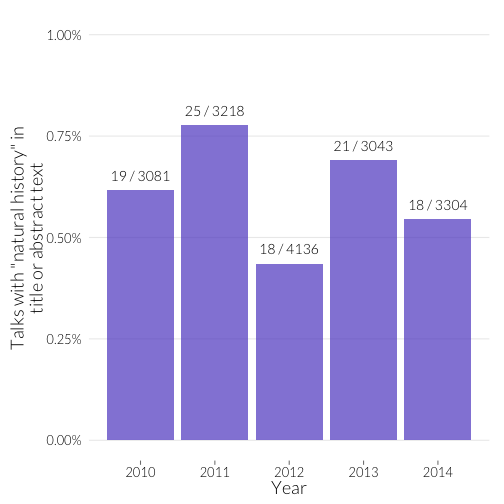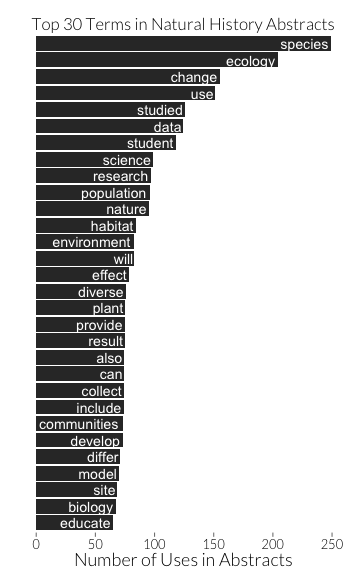After my last post text-mining ESA Annual Meeting abstracts, Nash Turley was interested in the presence of the term “natural history” in ESA abstracts. I decided to collect a little more data by including programs back to 2010, giving a five-year data set. Thankfully the program back to 2010 remains in mostly the same format, so it’s easy to pull the data for these additional years.
Now, not all talks that include natural history concepts will include the term “natural history”1 in their abstracts, but it’s frequency may be an indicator of importance, and variation in use of the term is may yield some insights.
First, I look at what fraction of abstracts mention “natural history” in each of the last five years at ESA.

Over the past five years, <1% of abstracts at ESA have mentioned natural history. No trend is evident.
I reported different numbers for 2013 and 2014 in a tweet last week. These were higher because I counted them by a simple search of the number of occurrences of “natural history” in the whole corpus. This included the affiliation fields. Many presenters at ESA work at natural history museums (see this abstract, for instance). The above numbers now only include abstracts where “natural history” was in the title or abstract text, and now I count abstracts, not occurrences of the phrase.
What are these natural history talks about? To examine this, I looked at the word frequency across all five years of abstracts, finding the most frequent terms besides “natural history”.

For comparison, here are the most common terms across all ESA abstracts this year:

Like other abstracts, talks that mention “natural history” have “species” as the most common term. Interestingly, natural history talks don’t use “plant” as frequently - perhaps other terms are used in botanical contexts. Also, there are more relative mentions of “students”, perhaps due to greater links between natural history and education. We can see this pattern in a listing of all the talks for 2014, where we see several talks about education, though there are many fascinating basic science talks, as well:
I note the third talk in this list is an ignite talk announcing the new ESA natural history section. Perhaps we’ll see the effect of this section next year’s program!
R code for this post is on Github.
Or rather, something close to “natural history”. I searched for the regular expression
natur\w+\s+hist.↩